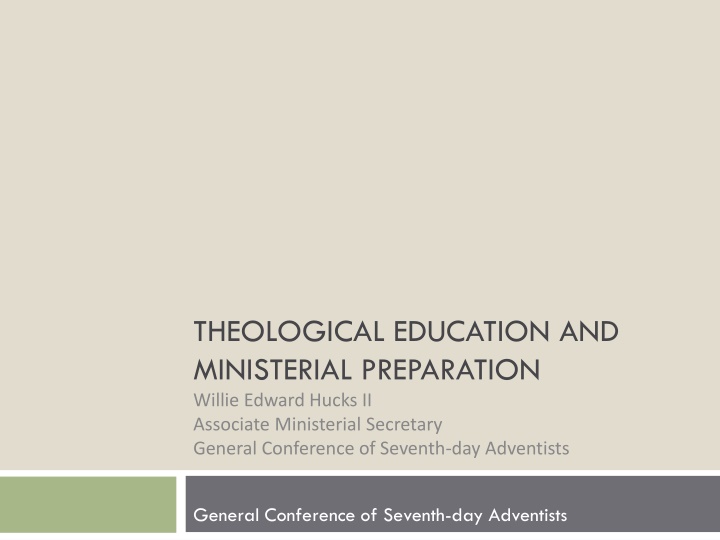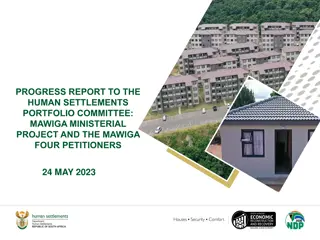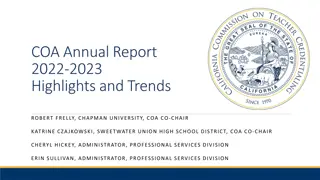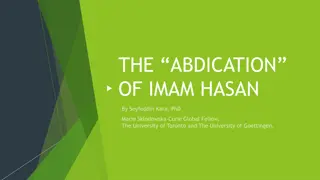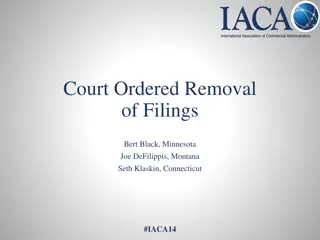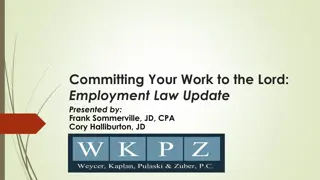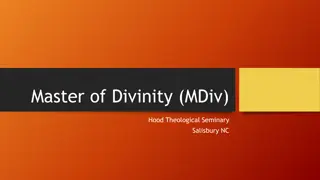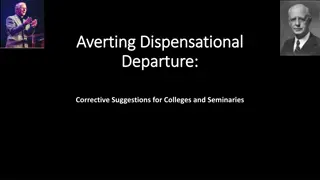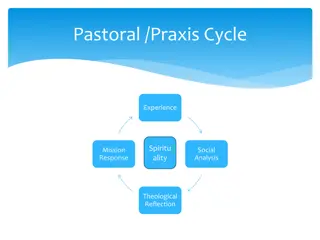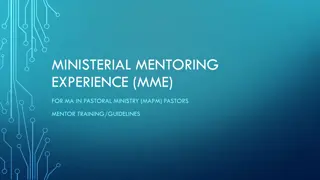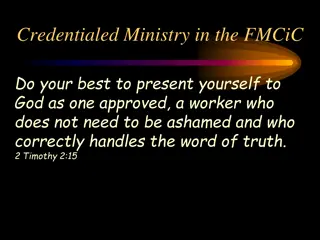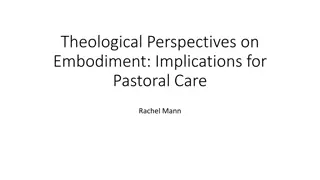Essential Aspects of Theological Education and Ministerial Preparation
Thorough preparation of candidates for ministry is crucial for ensuring the unity of the church's message and mission. The role of the ministerial secretary is vital in contributing to the development of curriculum, ongoing spiritual growth, mentoring, recruitment, and placement. The ministerial training process involves undergraduate and seminary degrees, along with field assignments leading to ordination. Field assignments provide practical development beyond classroom learning, and intern supervisor trainers play a crucial role in passing on essential skills. It is cautioned that pastors of large churches may not always be the best mentors for young pastors, emphasizing the importance of thoughtful placement of trainees.
Uploaded on Sep 28, 2024 | 1 Views
Download Presentation

Please find below an Image/Link to download the presentation.
The content on the website is provided AS IS for your information and personal use only. It may not be sold, licensed, or shared on other websites without obtaining consent from the author.If you encounter any issues during the download, it is possible that the publisher has removed the file from their server.
You are allowed to download the files provided on this website for personal or commercial use, subject to the condition that they are used lawfully. All files are the property of their respective owners.
The content on the website is provided AS IS for your information and personal use only. It may not be sold, licensed, or shared on other websites without obtaining consent from the author.
E N D
Presentation Transcript
THEOLOGICAL EDUCATION AND MINISTERIAL PREPARATION Willie Edward Hucks II Associate Ministerial Secretary General Conference of Seventh-day Adventists General Conference of Seventh-day Adventists
Thorough Preparation Necessary Thorough preparation of candidates for ministry is an essential task for guaranteeing the unity of the church s message and mission.
Role of Ministerial Secretary While universities and seminaries develop curricula for their theology and ministerial students, the ministerial secretary should remain aware of and contribute to what transpires in ministerial preparation and theological education.
Areas In Which the Ministerial Secretary Should Contribute Ongoing spiritual growth mentoring Curriculum development Recruitment Placement
Ministerial Training Process 3-4 years undergraduate degree in theology or religion 1-2 years of a field-based internship under the direction of an intern supervisor-trainer 2-3 years seminary degree 3-4 years of field assignments in preparation for ordination
Field Assignment Leading to Ordination Provides young ministers opportunities for on-the-job development that exceed the internship that transpired during university studies development that cannot take place in the classroom. Ideally 1-2 years between university and seminary studies better prepares the young pastor to see the value of further study. He can better apply classroom learning to real-life situations.
Intern Supervisor Trainers Needed Such Trainers should possess necessary skills to pass along their spiritual, evangelistic, nurturing, and administrative proficiencies.
Cautions Pastors of large churches are not necessarily the best candidates for supervising, training, or mentoring young pastors. Young pastors should not be assigned to a given church simply because an associate pastor is needed. Doing so defeats the purpose for placing a trainee in such a setting.
Ellen G. White Counsel In gaining a preparation for the ministry [the young] should be associated with older ministers. Those who have gained an experience in active service are to take young, inexperienced workers with them into the harvest field, teaching them how to labor successfully for the conversion of souls .
Ellen G. White Counsel (continued) Kindly and affectionately these older workers are to help the younger ones to prepare for the work to which the Lord may call them. And the young in training should respect the counsel of their instructors, honoring their devotion, and remembering that their years of labor have given them wisdom. (Gospel Workers, 101)
Looking Ahead to Ordination Conference leaders are responsible for adequately preparing candidates for ordination within this 10-year timeframe. Ordination is the church s recognition of God s call to ministry upon the life of the pastor. It is not a reward for a lifetime of service. If a candidate is not ready for ordination within this 10- year timeframe, that pastor should be counseled to seek another line of work.
Final Counsel The ministerial secretary should clearly explain to unordained workers the process leading to ordination. Interns should receive updates annually. Marriage is not a requirement for ordination. An appropriate ordination service is outlined in the Minister s Handbook.
